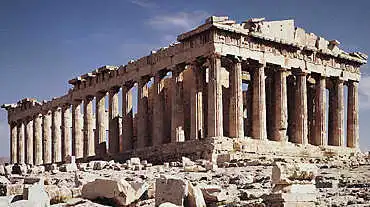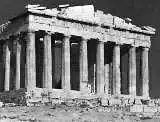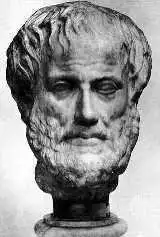Cosmos of the Ancients The Greek Philosophers on Myth and CosmologyEmpedocles s for Empedocles (c. 490-430 BC), he saw the world as somewhat a battleground of two major forces — love (Philia) joining things together, and strife (Neikos) breaking them apart.
s for Empedocles (c. 490-430 BC), he saw the world as somewhat a battleground of two major forces — love (Philia) joining things together, and strife (Neikos) breaking them apart.
To him the basic elements were four, each one bearing the name of a god — Zeus was fire, Hera was air, Aidoneus was earth and Nestis water: Hear first the four roots of all things: bright Zeus and life-bringing Hera and Aidoneus and Nestis, whose tears are the source of mortal streams. Love he also calls joy, linking it to the goddess Aphrodite. No god was, though, in any way of human countenance: For he is not equipped with a human head on a body, [two branches do not spring from his back], he has no feet, no swift knees, no shaggy genitals, but he is mind alone, holy and inexpressible, darting through the whole cosmos with swift thoughts. In his poetic vision with a flare for magnificence — that of nature as well as that of himself — Empedocles saw in this everlasting exchange between love and strife, between joining and separating, a beauty that is easy to appreciate: And these things never cease their continual exchange of position, at one time all coming together into one through love, at another again being borne away from each other by strife's repulsion. Both birth and death he regarded as illusions, misconceptions of what was the mixing and change taking place in the dynamics between love and strife. Therefore, he could easily embrace the idea of the soul passing from one body to another — sometimes human, sometimes of another species: "For before now I have been at some time boy and girl, bush, bird, and a mute fish in the sea." He obviously saw comfort in this — neither birth nor death exists: Here is another point: of all mortal things no one has birth, or any end in pernicious death, but there is only mixing, and separating of what has been mixed, and to these men give the name 'birth'. Also, his view of souls related across the boundaries of species, led him to firmly oppose the sacrifice of animals, as well as at all eating their meat: "Alas that the pitiless day did not destroy me first, before I devised for my lips the cruel deed of eating flesh." He saw in this nothing other than cannibalism, the eating of one's own kind, just as clearly as were the animals one's siblings or children of one's own flesh: Will you not cease from the din of slaughter? Do you not see that you are devouring one another because of your careless way of thinking? Aristotle, presenting the cosmology of Empedocles in straightforward words, has some objections to its inconsistencies, claiming that often love breaks apart instead of joins, and it can also happen that strife joins. What Aristotle sees as the cause behind love and strife must be all good and all bad, and thereby he finds it accurate to regard Empedocles as the first of all, to point out good and bad as primary causes.
LiteratureWright, M. R., Empedocles: the Extant Fragments, New Haven 1981.Aristotle, Metaphysics, 984b-985a, translated by Hugh Lawson-Tancred, London 1998.
© Stefan Stenudd 2000

The Greek Philosophers
AristotleIntroductionAristotle's LifeTimelineAristotle's PoeticsAristotle's CosmologyAbout CookiesMy Other WebsitesCREATION MYTHSMyths in general and myths of creation in particular.
TAOISMThe wisdom of Taoism and the Tao Te Ching, its ancient source.
LIFE ENERGYAn encyclopedia of life energy concepts around the world.
QI ENERGY EXERCISESQi (also spelled chi or ki) explained, with exercises to increase it.
I CHINGThe ancient Chinese system of divination and free online reading.
TAROTTarot card meanings in divination and a free online spread.
ASTROLOGYThe complete horoscope chart and how to read it.
MY AMAZON PAGE
MY YOUTUBE AIKIDO
MY YOUTUBE ART
MY FACEBOOK
MY INSTAGRAM
STENUDD PÅ SVENSKA
|
 Cosmos of the Ancients
Cosmos of the Ancients